BBC News, Delhi
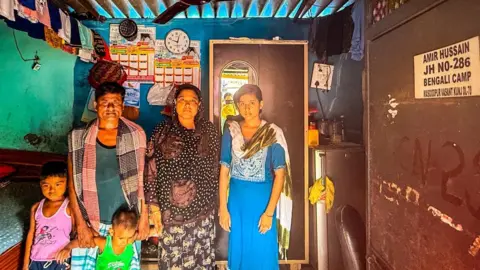 Zoya Mateen/BBC
Zoya Mateen/BBCIn Gurugram, an upscale suburb just outside Delhi, gleaming SUVs, futuristic skyscrapers and neat apartments stand in stark contrast to nearby mosquito swarms, trash heaps and tarpaulin shanties.
Inside the gated compounds live some of India’s richest, while in the slums nearby live poor migrant workers – mostly domestic helpers, garbage-pickers and daily-wage workers.
Last month, local authorities rounded up hundreds of these workers, most of whom say they are Bengali-speaking Muslims from India’s West Bengal state, in a “verification” drive targeting illegal Bangladeshi immigrants.
The suspects were detained and kept at “holding centres” where they were asked to provide documents to prove their citizenship. Many allege they were beaten and mistreated by police during the process. Police officials deny these allegations.
“I had my voter and national ID cards, but they told me they were fake. I spent six days not knowing my fate before I was finally released,” said Ather Ali Sheikh, a daily-wage worker, who has lived in the city for 15 years.
The action has left indelible scars on the social fabric of the city, which prides itself on its cosmopolitan culture. Hundreds of workers have fled overnight – abandoning jobs, homes and, in some cases, even families in their haste to escape.
“I still don’t understand why they suddenly came after me,” Mr Sheikh said. Behind him, his wife hurriedly packed their belongings – torn clothes, old utensils and school books – into flimsy boxes.
“Was it because of my language, my religion or because I am poor? ” Mr Sheikh continued, his face hardening with anger. “Why weren’t the rich Bengali residents held up?”
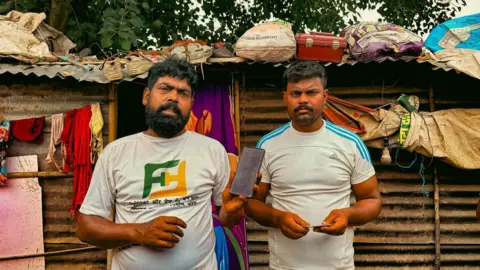 Zoya Mateen/BBC
Zoya Mateen/BBCPolice in Gurugram deny targeting any particular community. “Neither religion nor class has anything to do with the drive,” public relations officer Sandeep Kumar told the BBC.
He added that out of the 250 people picked up, only 10 have been identified as illegal migrants and will actually be deported.
“Everyone else was released. No one was mistreated at the centres. We have been completely fair and objective.”
Meanwhile, trepidation is being felt on other side of the city as well.
With no workers left, heaps of trash have been overflowing from public bins and dump yards on to the streets, inconveniencing residents.
“Our house help and her husband, who worked as a driver, both left and now we have no help,” said Tabassum Bano, who lives in one of the complexes.
Crackdowns on alleged illegal immigrants from Muslim-majority Bangladesh are not new in India. The countries are divided by a porous border 4,096km (2,545-mile) long, and have seen waves of movement of people on both sides.
But these efforts seem to have intensified under Prime Minister Narendra Modi’s government.
In recent months, hundreds of people, including a veteran Muslim officer of the Indian Army, have been arrested on suspicion of being illegal migrants.
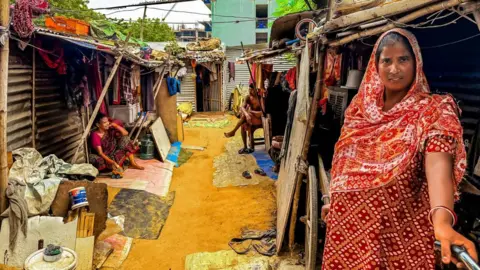 Zoya Mateen/BBC
Zoya Mateen/BBCIn the north-eastern state of Assam, where the issue has been a potent flashpoint for decades, authorities have been “pushing back” hundreds of Bengali-Muslims into Bangladesh on suspicion of them being “illegal Bangladeshis”.
Deportations are also under way in Delhi, where some 700 people were picked up and flown out to border states in the last six months.
This has had a chilling impact on the community.
In Gurugram, a sense of shock prevailed over their dust-blanketed colonies.
“For years, we have cleaned and collected their garbage. Now we are being treated like it ourselves,” said Rauna Bibi.
A domestic help, Rauna’s husband had returned from West Bengal the same day the detentions began. When he heard about it, he was so terrified he left again – this time, without informing his wife.
“For three days, I wondered if he was picked up; whether he was even alive,” Rauna said. “When we finally spoke, he said he didn’t call because he did not want any trouble.”
But it was not her husband’s behaviour that bothered Rauna, or the fact that he was now jobless. It was the theft of her pride – and the comfort of belonging to a place – that hurt her the most, making her feel absurdly insignificant.
“Unlike poverty, I can’t fight this with my hard work,” she said. “If they pick us, I wouldn’t know how to survive. This slum, the work we do and the houses we clean – this is our entire life.”
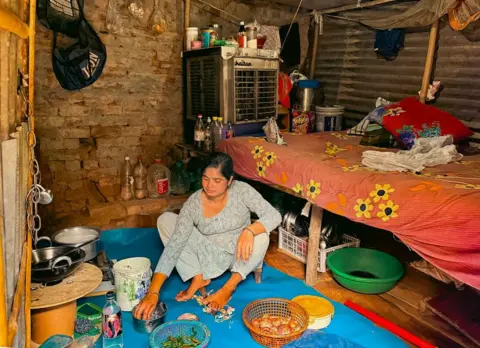 Zoya Mateen/BBC
Zoya Mateen/BBCMr Kumar says the recent action is based on a home ministry notice from May that lays down new guidelines for deporting illegal immigrants.
Under the order, all states are required to set up a special task force along with holding centres to “detect, identify and deport/send back illegal immigrants settled from Bangladesh and Myanmar”.
Each person would be given 30 days to prove their citizenship, during which authorities would send their documents back to their home districts for verification.
If they fail to confirm the details, the suspects would be taken by the police “under proper escort, in groups as far as possible”, and handed over to the border forces for deportation.
Critics, however, have questioned the order, saying it does not specify the basis on which a person is made a suspect.
“On the face of it, it’s nothing other than the fact that you speak Bengali, have a Muslim name and live in shanty,” said Aakash Bhattacharya, of the national council of the All India Central Council of Trade Unions which advocates for workers’ rights.
What is worse is that none of the suspects are being given certificates confirming their citizenship had already been verified, he added.
“This means they can be put through the same process again, making them extremely vulnerable.”
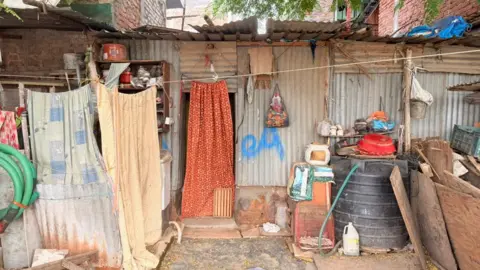 Zoya Mateen/BBC
Zoya Mateen/BBC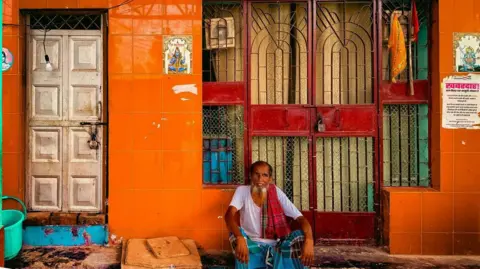 Zoya Mateen/BBC
Zoya Mateen/BBCMr Kumar says the detentions in Gurugram were made on the basis of strong preliminary evidence.
“We checked their phones and found suspicious contacts from Bangladesh. Some of them also failed to answer questions about their ancestry during interrogation,” he said.
Suhas Chakma, a human rights worker, says that the policy is not necessarily religious-specific.
“The arrest of the Muslims appears to be more as they constitute about 95% of Bangladesh’s population,” he explained.
But for a country that has seen an influx of refugees for decades, India does need a wider refugee law to address many of these complex issues, he added.
For now, Bengali-Muslims are living with a deep sense of foreboding.
Many of them have been sleeping with documents tucked under the pillow in case misfortune strikes.
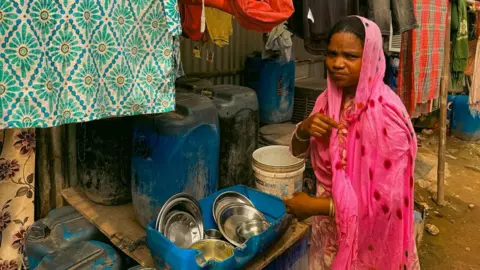 Zoya Mateen/BBC
Zoya Mateen/BBC“We were already fighting the harsh reality of our lives. Now we have to fight this too,” said Rabi-ul-Hassan, a resident of Jai Hind camp, a massive slum located in one of the poshest corners of Delhi.
Three weeks ago, authorities cut off electricity in the area, instantly plunging some 400 people into darkness.
The action came after a court ruled that the slum-dwellers, who say they have lived there for generations, were squatting on private land.
“They did this even when the area is recognised as a legal slum by the city’s own urban planning organisation,” said Abhik Chimni, a lawyer who is challenging the order.
Since then residents have been in some kind of stupor, dazed, angry and tired. “The heat is unbearable. The food keeps rotting and the children don’t stop crying. At night, we try to sleep outside but then mosquitoes bite us,” said Baijan Bibi.
“I am so exhausted,” she continued, “that sometimes I wonder if it’s better to live in a holding centre. At least there will be a fan there, right?”







